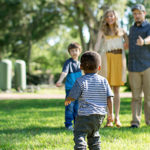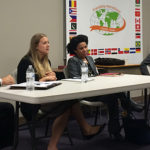DALLAS—Children mostly likely to get stuck in the foster care system without placement in a family are those who need a home where they can receive therapeutic care—children with significant physical, medical, psychological or behavioral challenges, often due to trauma.
To care for these children, foster families must go through additional training and certification. While the extra training may seem daunting at first, the Biles family of Dallas found caring for children with more complex needs has brought them more joy in serving and helping to rehabilitate those children than any other earthly endeavor.
A heart for ‘kids in crisis’
Felicia Biles and her husband, Phillip, have fostered the past 11 years while raising their two birth children, Lydia, 16, and Corban, 15. They choose to care for children classified as having therapeutic needs.
The Biles became certified for foster care when Corban turned 2, and after a few years, they started caring for children with more significant emotional and behavioral needs.
“Our heart is really more for the kid in crisis who needs some help, some stability in their lives,” Philip Biles said. “So, our call really has been foster only, just coming alongside parents. No matter how poor some of the choices the moms or dads make, the kids still love their biological parents. They still want that connection and relationship.
“So, over the years, we’ve really been pursuing that type of stability of a family. ‘OK, Mom or Dad, you get your life together, as long as it takes. We want you to have your child back. We want them to go home.’”
Although it’s not always easy, Biles said, they take the good with the bad.
“Your life isn’t over just because you decide to do foster care,” he said. “You can still live your life and accomplish your goals and dreams.”
Sign up for our weekly edition and get all our headlines in your inbox on Thursdays
Support from Buckner appreciated
The couple said they have felt the most supported with Buckner Foster Care and Adoption through prayer, continuing education and training, and making their biological children feel included.
“We love that Buckner has that passion for families,” Biles said. “Not just the families where kids are coming from but current foster families, current adoptive families. They really are very supportive and caring for this family unit.”
Even their now-teenaged children have played a part in bringing awareness to foster care and trying to de-stigmatize it.
 Lydia and Corban Biles enjoy having foster brothers and sisters come live with them. (Photo / Chelsea Q. White / Buckner)Lydia and Corban love having new brothers and sisters come live with them and have a lot of compassion for children in crisis in general, not just children in foster care. They also have opportunities to tell other students at school about foster care.
Lydia and Corban Biles enjoy having foster brothers and sisters come live with them. (Photo / Chelsea Q. White / Buckner)Lydia and Corban love having new brothers and sisters come live with them and have a lot of compassion for children in crisis in general, not just children in foster care. They also have opportunities to tell other students at school about foster care.
“For us, (foster care) is normal,” Corban said. “It’s not like we went half our lives and then started doing foster care. It’s something we’ve been doing our whole lives.”
The Biles feel equipped to help children who are in serious crisis situations. A child’s story might look bad on paper, they said, but they’ve been pleasantly surprised how much they really can help children and their families make positive changes in their lives.
Families reunited
“It’s definitely neat to see a child be reunited with the biological family, but I think one of the joys that we get is seeing the moms or the families realize, wow, they were on our side, and they’ve been able to help me get my kids back,” Philip Biles said.
“Our satisfaction comes from the design of the family, not just the child, just that whole family unit. Every family goes through crisis and every family has difficult moments. But just knowing that God put that family together is something we’ve been able to play a small role in at times.”
Becoming licensed to take in children who have significant emotional, physical and medical needs certainly is not for everyone, he said.
“But Buckner is all about helping to provide resources and tools,” he added. “They do a great job with respite care and connecting foster families in your area together. As you’re driving through this, you really feel like they’re with you the whole way. Sometimes they’re just there, observing, and other times, they’re helping you figure out which way to turn.”
To learn more about therapeutic foster care, click here.














We seek to connect God’s story and God’s people around the world. To learn more about God’s story, click here.
Send comments and feedback to Eric Black, our editor. For comments to be published, please specify “letter to the editor.” Maximum length for publication is 300 words.